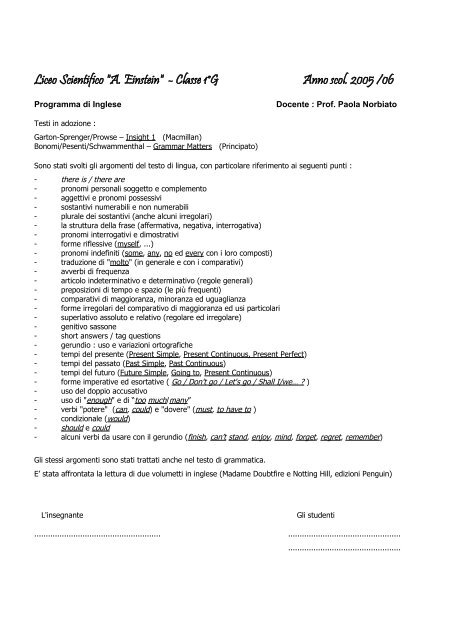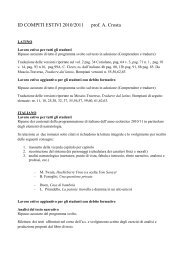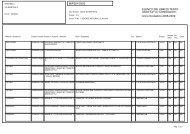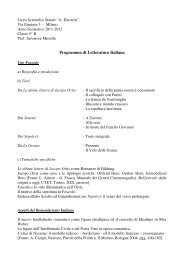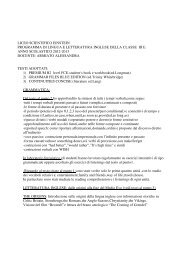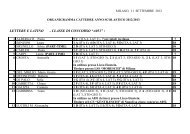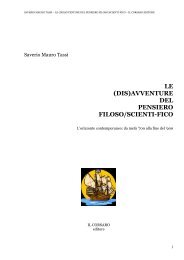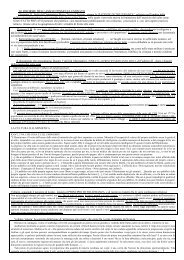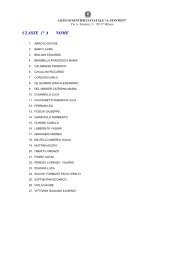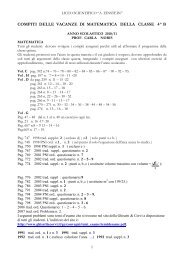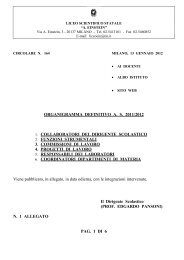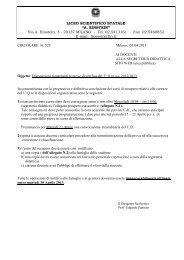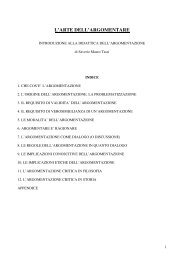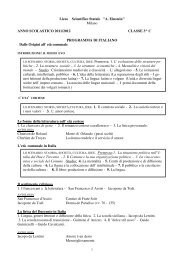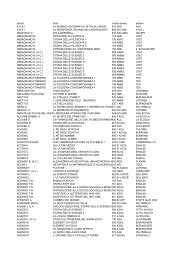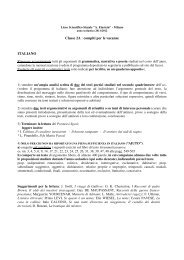Liceo scientifico Albert Einstein
Liceo scientifico Albert Einstein
Liceo scientifico Albert Einstein
Create successful ePaper yourself
Turn your PDF publications into a flip-book with our unique Google optimized e-Paper software.
<strong>Liceo</strong> Scientifico "A. <strong>Einstein</strong>" - Classe 1°G Anno scol. 2005 /06<br />
Programma di Inglese<br />
Docente : Prof. Paola Norbiato<br />
Testi in adozione :<br />
Garton-Sprenger/Prowse – Insight 1 (Macmillan)<br />
Bonomi/Pesenti/Schwammenthal – Grammar Matters (Principato)<br />
Sono stati svolti gli argomenti del testo di lingua, con particolare riferimento ai seguenti punti :<br />
- there is / there are<br />
- pronomi personali soggetto e complemento<br />
- aggettivi e pronomi possessivi<br />
- sostantivi numerabili e non numerabili<br />
- plurale dei sostantivi (anche alcuni irregolari)<br />
- la struttura della frase (affermativa, negativa, interrogativa)<br />
- pronomi interrogativi e dimostrativi<br />
- forme riflessive (myself, ...)<br />
- pronomi indefiniti (some, any, no ed every con i loro composti)<br />
- traduzione di "molto" (in generale e con i comparativi)<br />
- avverbi di frequenza<br />
- articolo indeterminativo e determinativo (regole generali)<br />
- preposizioni di tempo e spazio (le più frequenti)<br />
- comparativi di maggioranza, minoranza ed uguaglianza<br />
- forme irregolari del comparativo di maggioranza ed usi particolari<br />
- superlativo assoluto e relativo (regolare ed irregolare)<br />
- genitivo sassone<br />
- short answers / tag questions<br />
- gerundio : uso e variazioni ortografiche<br />
- tempi del presente (Present Simple, Present Continuous, Present Perfect)<br />
- tempi del passato (Past Simple, Past Continuous)<br />
- tempi del futuro (Future Simple, Going to, Present Continuous)<br />
- forme imperative ed esortative ( Go / Don't go / Let's go / Shall I/we… ? )<br />
- uso del doppio accusativo<br />
- uso di "enough" e di “too much/many”<br />
- verbi "potere" (can, could) e "dovere" (must, to have to )<br />
- condizionale (would)<br />
- should e could<br />
- alcuni verbi da usare con il gerundio (finish, can’t stand, enjoy, mind, forget, regret, remember)<br />
Gli stessi argomenti sono stati trattati anche nel testo di grammatica.<br />
E’ stata affrontata la lettura di due volumetti in inglese (Madame Doubtfire e Notting Hill, edizioni Penguin)<br />
L'insegnante<br />
Gli studenti<br />
....................................................... .................................................<br />
.................................................
<strong>Liceo</strong> Scientifico "A. <strong>Einstein</strong>" - Classe 1°B Anno scol. 2005 /06<br />
Programma di Inglese<br />
Docente : Prof. Paola Norbiato<br />
Testi in adozione :<br />
Liz & John Soars - Headway Pre-Intermediate (Oxford U.P.)<br />
Bonomi/Pesenti/Schwammenthal – Grammar Matters (Principato)<br />
Sono stati svolti gli argomenti delle unità 1-7 del testo di lingua, con particolare riferimento ai seguenti punti :<br />
- there is / there are<br />
- pronomi personali soggetto e complemento<br />
- aggettivi e pronomi possessivi<br />
- sostantivi numerabili e non numerabili<br />
- plurale dei sostantivi (anche alcuni irregolari)<br />
- la struttura della frase (affermativa, negativa, interrogativa)<br />
- pronomi interrogativi e dimostrativi<br />
- forme riflessive (myself, ...)<br />
- pronomi indefiniti (some, any, no ed every con i loro composti)<br />
- traduzione di "molto" (in generale e con i comparativi)<br />
- avverbi di frequenza<br />
- articolo indeterminativo e determinativo (anche alcune particolarità)<br />
- preposizioni di tempo e spazio (le più frequenti)<br />
- comparativi di maggioranza, minoranza ed uguaglianza<br />
- forme irregolari del comparativo di maggioranza ed usi particolari<br />
- superlativo assoluto e relativo (regolare ed irregolare)<br />
- genitivo sassone<br />
- gerundio : uso e variazioni ortografiche<br />
- tempi del presente (Present Simple, Present Continuous, Present Perfect)<br />
- tempi del passato (Past Simple, Past Continuous)<br />
- tempi del futuro (Future Simple, Going to, Present Continuous)<br />
- forme imperative ed esortative ( Go / Don't go / Let's go / Shall I/we… ? )<br />
- uso di "enough"<br />
- verbi "potere" (can, could) e "dovere" (must, to have to )<br />
- condizionale (would)<br />
- should e could<br />
- i correlativi “either … or” e “both … and”<br />
- formazione aggettivi e sostantivi con prefissi e suffissi<br />
Gli stessi argomenti sono stati trattati anche nel testo di grammatica.<br />
E’ stata affrontata la lettura di due volumetti in inglese (Madame Doubtfire e Notting Hill, edizioni Penguin)<br />
L'insegnante<br />
Gli studenti<br />
....................................................... ...............................................……<br />
...............................................……
<strong>Liceo</strong> Scientifico "A. <strong>Einstein</strong>" - Classe 3°G Anno scol. 2005 /06<br />
Programma di Inglese<br />
Docente : Prof. Paola Norbiato<br />
Testi in adozione :<br />
Spiazzi/Tavella - Only Connect - volume One (Zanichelli)<br />
Maule/du Vivier - Pass FCE (Cideb/Black Cat)<br />
LETTERATURA<br />
The Origins (700 B.C. - 1066 A.D.)<br />
THE HISTORICAL and SOCIAL CONTEXT<br />
THE LITERARY CONTEXT<br />
* Poetry as a literary genre p. A20<br />
* Musical devices p. A22<br />
The Middle Ages (1066 - 1485)<br />
THE HISTORICAL and SOCIAL CONTEXT from p. A42<br />
THE LITERARY CONTEXT<br />
The desire to reveal p. A54<br />
* Language devices p. A56<br />
The medieval ballad p. A58<br />
The medieval narrative poem p. A60<br />
The medieval drama p. A62<br />
AUTHORS AND TEXTS<br />
Popular Ballads Lord Randal p. A64<br />
The Wife of Usher's Well<br />
fotocopia<br />
Barbara Allen<br />
fotocopia<br />
Geoffrey Chaucer p. A75<br />
The Canterbury Tales p. A76<br />
- April sweet showers p. A77<br />
- The Prioress p. A80<br />
- The Poor Parson p. A88<br />
- The Pardoner fotocopia<br />
Everyman p. A90<br />
- The Last Journey p. A90<br />
- Everyman meets Death fotocopia<br />
Thomas Malory p. A92
The Renaissance (1485 - 1660)<br />
THE HISTORICAL and SOCIAL CONTEXT from p. B2<br />
THE LITERARY CONTEXT<br />
New Learning p. B17<br />
The Sonnet p. B18<br />
* Rhythm and scale of consonant sounds p. B20<br />
The Mirror of Life p. B25<br />
Theatres and Acting Companies p. B26<br />
* Drama as a Literary Genre p. B28<br />
* The features of a dramatic text p. B30<br />
AUTHORS AND TEXTS<br />
Th. Wyatt - I Find No Peace (lettura) p. B32<br />
E. Spenser - One Day I Wrote Her Name ... p. B35<br />
- Ye Tradeful Merchants fotocopia<br />
Philip Sidney - Loving in Truth .... fotocopia<br />
- Come Sleep, O Sleep .... fotocopia<br />
Thomas More - The City of Utopia p. B36<br />
- Utopians despise Gold fotocopia<br />
- Laws in Utopia fotocopia<br />
Ch. Marlowe - Faustus’s Last Monologue p. B41<br />
- parte finale fotocopia<br />
W. Shakespeare : Sonnets p. B44<br />
- Shall I compare thee.... p. B45<br />
- My Mistress’ Eyes ... p. B49<br />
Shakespeare the dramatist p. B50<br />
Romeo and Juliet - The Prologue (lettura) p. B62<br />
- The Balcony Scene (lettura) p. B65<br />
LINGUA<br />
Sono state svolte le Unità 1, 2 e 3 con relativi esercizi grammaticali e lessicali; le unità 5, 6, 7, 9, 10 ed 11 sono<br />
state trattate come “topic” con la conversatrice. Sono inoltre stati ripassati i seguenti argomenti grammaticali :<br />
pronomi relativi<br />
Simple Past e Present Perfect (continuato e semplice)<br />
Used to vs Be/Get used to<br />
Passive<br />
First and Second Conditional<br />
L'insegnante Gli studenti<br />
..................................................... .....................................................<br />
.....................................................
<strong>Liceo</strong> Scientifico "A. <strong>Einstein</strong>" - Classe 3°B Anno scol. 2005 /06<br />
Programma di Inglese<br />
Docente : Prof. Paola Norbiato<br />
Testi in adozione : Spiazzi/Tavella - Only Connect - volume One (Zanichelli)<br />
Mann/Taylore-Knowles - Laser (Macmillan)<br />
LETTERATURA<br />
The Origins (700 B.C. - 1066 A.D.)<br />
THE HISTORICAL and SOCIAL CONTEXT<br />
THE LITERARY CONTEXT<br />
* Poetry as a literary genre p. A20<br />
* Musical devices p. A22<br />
The Middle Ages (1066 - 1485)<br />
THE HISTORICAL and SOCIAL CONTEXT from p. A42<br />
THE LITERARY CONTEXT<br />
The desire to reveal p. A54<br />
* Language devices p. A56<br />
The medieval ballad p. A58<br />
The medieval narrative poem p. A60<br />
The medieval drama p. A62<br />
AUTHORS AND TEXTS<br />
Popular Ballads Lord Randal p. A64<br />
The Wife of Usher's Well<br />
fotocopia<br />
Barbara Allen<br />
fotocopia<br />
Geoffrey Chaucer p. A75<br />
The Canterbury Tales p. A76<br />
- April sweet showers p. A77<br />
- The Prioress p. A80<br />
- The Poor Parson p. A88<br />
- The Pardoner fotocopia<br />
Everyman p. A90<br />
- The Last Journey p. A90<br />
- Everyman meets Death fotocopia<br />
Thomas Malory p. A92
The Renaissance (1485 - 1660)<br />
THE HISTORICAL and SOCIAL CONTEXT from p. B2<br />
THE LITERARY CONTEXT<br />
New Learning p. B17<br />
The Sonnet p. B18<br />
* Rhythm and scale of consonant sounds p. B20<br />
The Mirror of Life p. B25<br />
Theatres and Acting Companies p. B26<br />
* Drama as a Literary Genre p. B28<br />
* The features of a dramatic text p. B30<br />
AUTHORS AND TEXTS<br />
Th. Wyatt - I Find No Peace (lettura) p. B32<br />
E. Spenser - One Day I Wrote Her Name ... p. B35<br />
- Ye Tradeful Merchants fotocopia<br />
Philip Sidney - Loving in Truth .... fotocopia<br />
- Come Sleep, O Sleep .... fotocopia<br />
- With how sad steps, o Moon fotocopia<br />
Thomas More - The City of Utopia p. B36<br />
- Utopians despise Gold fotocopia<br />
- Laws in Utopia fotocopia<br />
Ch. Marlowe - Faustus’s Last Monologue p. B41<br />
- parte finale (coro) fotocopia<br />
W. Shakespeare : Sonnets p. B44<br />
- Shall I compare thee.... p. B45<br />
- The Marriage of true Minds p. B46<br />
- My Mistress’ Eyes ... p. B49<br />
Shakespeare the dramatist p. B50<br />
Romeo and Juliet - The Prologue (lettura) p. B62<br />
- The Balcony Scene (lettura) p. B65<br />
LINGUA<br />
Sono state svolte le Unità 1, 2, 3 e 4 con i relativi esercizi grammaticali e lessicali; sono state usate fotocopie<br />
come base per gli argomenti da affrontare con la conversatrice.<br />
L'insegnante Gli studenti<br />
..................................................... .....................................................<br />
.....................................................
<strong>Liceo</strong> Scientifico "A. <strong>Einstein</strong>" - Classe 4°H Anno scol. 2005 /06<br />
Programma di Inglese<br />
Docente : Prof. Paola Norbiato<br />
Testi in adozione : Spiazzi/Tavella - Only Connect - volume One + Two (Zanichelli)<br />
Anne Louise Woods - Vision (Burlington Books)<br />
LETTERATURA<br />
The Renaissance (1485 - 1660)<br />
THE LITERARY CONTEXT<br />
William Shakespeare p. B 50<br />
“The Merchant of Venice”<br />
from "Othello" : Othello's courtship fotoc.<br />
Not wisely but too well<br />
fotoc.<br />
from "Macbeth" : The Three Witches p. B100<br />
Duncan's Murder<br />
p. B101<br />
A Tale told by an Idiot<br />
p. B106<br />
The Puritan Age (1625-1660)<br />
THE HISTORICAL and SOCIAL CONTEXT<br />
THE LITERARY CONTEXT<br />
Metaphysical Poetry<br />
p. B139<br />
John Donne Song p. B144<br />
The Sun Rising<br />
p. B146<br />
Batter My Heart ....<br />
fotoc.<br />
A Valediction: Forbidding Mourning<br />
fotoc.<br />
G. Herbert Easter Wings p. B148<br />
Andrew Marvell To His Coy Mistress<br />
p. B150<br />
John Milton from "Paradise Lost" : Satan's Speech p. B154<br />
Sonnet XVII: On His Blindness<br />
p. B157<br />
The Restoration (1660 - 1702)<br />
THE HISTORICAL and SOCIAL CONTEXT<br />
THE LITERARY CONTEXT<br />
Wit and science p. C 10<br />
The Enjoyment of the Senses p. C 14<br />
* The Features of a comedy p. C 16<br />
John Dryden King David, from "Absalom and Achitophel" p. C 19<br />
William Congreve The Sealing of the Deed (from "The Way of the World") p. C 24<br />
Samuel Pepys The Great Fire: First Day p. C 28
The Augustan Age (1714 - 1760)<br />
THE SOCIAL CONTEXT and THE WORLD PICTURE<br />
THE LITERARY CONTEXT<br />
Artifice and Real Life p. C 44<br />
Journalism p. C 46<br />
The Rise of the Novel p. C 49<br />
* Introduction to Fiction as a genre p. C 50<br />
* Types of novel p. C 52<br />
* The features of a narrative text p. C 54<br />
* Satire, irony and humour p. C 56<br />
Daniel Defoe from "Moll Flanders" - Moll becomes a thief p. C 66<br />
brani tratti da "Robinson Crusoe"<br />
Jonathan Swift from "A Modest Proposal" - It is a Melancholy Object p. C 73<br />
from "Gulliver's Travels" - Language Reforms and New Teaching Methods p. C 78<br />
S. Richardson from "Pamela" - My Good Lady died p. C 82<br />
- Let me beg of you p. C 85<br />
Henry Fielding p. C 87<br />
Laurence Sterne from "Tristram Shandy" - When they begot me p. C 96<br />
- The very place p. C 99<br />
Alexander Pope from "The Rape of the Lock" - Belinda's Toilet<br />
p. C104<br />
The Early Romantic Age<br />
THE HISTORICAL and SOCIAL CONTEXT from p. D7<br />
Emotion vs Reason p. D11<br />
THE LITERARY CONTEXT<br />
New Trends in Poetry p. D16<br />
The Gothic Novel p. D17<br />
LINGUA<br />
Sono state svolte le unità 3, 4 e 5 con i relativi esercizi grammaticali e lessicali; inoltre sono state utilizzate l’unità<br />
8 e vari materiali in fotocopia come base per il lavoro con la conversatrice.<br />
L'insegnante<br />
Gli studenti<br />
...................................................... ....................................................<br />
....................................................
<strong>Liceo</strong> Scientifico "A. <strong>Einstein</strong>" - Classe 4°C Anno scol. 2005 /06<br />
Programma di Inglese<br />
Docente : Prof. Paola Norbiato<br />
Testi in adozione : Spiazzi/Tavella - Only Connect - volume One + Two (Zanichelli)<br />
Kendall / Green - Aiming High (Burlington Books)<br />
LETTERATURA<br />
The Renaissance (1485 - 1660)<br />
THE LITERARY CONTEXT<br />
William Shakespeare p. B 50<br />
“The Merchant of Venice”<br />
fotoc.<br />
from "Othello" : Othello's courtship fotoc.<br />
Not wisely but too well<br />
fotoc.<br />
from "Hamlet" : To Be, or Not to Be p. B 84<br />
from "Macbeth" : The Three Witches p. B100<br />
Duncan's Murder<br />
p. B101<br />
A Tale told by an Idiot<br />
p. B106<br />
The Puritan Age (1625-1660)<br />
THE HISTORICAL and SOCIAL CONTEXT<br />
THE LITERARY CONTEXT<br />
Metaphysical Poetry<br />
p. B139<br />
John Donne Song p. B144<br />
Batter My Heart ....<br />
fotoc.<br />
The Flea<br />
fotoc.<br />
Andrew Marvell To His Coy Mistress<br />
p. B150<br />
John Milton from "Paradise Lost" : Satan's Speech p. B154<br />
Sonnet XVII: On His Blindness<br />
p. B157<br />
The Restoration (1660 - 1702)<br />
THE HISTORICAL and SOCIAL CONTEXT<br />
THE LITERARY CONTEXT<br />
Wit and science p. C 10<br />
The Enjoyment of the Senses p. C 14<br />
* The Features of a comedy p. C 16<br />
John Dryden King David, from "Absalom and Achitophel" p. C 19<br />
William Congreve The Sealing of the Deed (from "The Way of the World") p. C 24<br />
Samuel Pepys The Great Fire: First Day p. C 28
The Augustan Age (1714 - 1760)<br />
THE SOCIAL CONTEXT and THE WORLD PICTURE<br />
THE LITERARY CONTEXT<br />
Artifice and Real Life p. C 44<br />
Journalism p. C 46<br />
The Rise of the Novel p. C 49<br />
* Introduction to Fiction as a genre p. C 50<br />
* Types of novel p. C 52<br />
* The features of a narrative text p. C 54<br />
* Satire, irony and humour p. C 56<br />
Daniel Defoe from "Moll Flanders" - Moll becomes a thief p. C 66<br />
brani tratti da "Robinson Crusoe"<br />
Jonathan Swift from "A Modest Proposal" - It is a Melancholy Object p. C 73<br />
from "Gulliver's Travels" - Language Reforms and New Teaching Methods p. C 78<br />
S. Richardson from "Pamela" - My Good Lady died p. C 82<br />
- Let me beg of you p. C 85<br />
Henry Fielding p. C 87<br />
Laurence Sterne from "Tristram Shandy" - When they begot me p. C 96<br />
- The very place p. C 99<br />
Alexander Pope from "The Rape of the Lock" - Belinda's Toilet<br />
p. C104<br />
The Early Romantic Age<br />
THE HISTORICAL and SOCIAL CONTEXT from p. D7<br />
Emotion vs Reason p. D11<br />
THE LITERARY CONTEXT<br />
New Trends in Poetry p. D16<br />
The Gothic Novel p. D17<br />
LINGUA<br />
Sono state svolte le unità 9 e 11 con i relativi esercizi grammaticali e lessicali; inoltre sono state utilizzate l’unità<br />
12, 13 e 20, oltre a vari materiali in fotocopia, come base per il lavoro con la conversatrice.<br />
L'insegnante<br />
Gli studenti<br />
...................................................... ....................................................<br />
.................................................….


